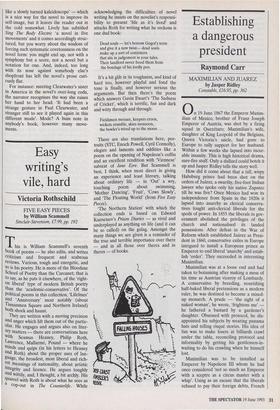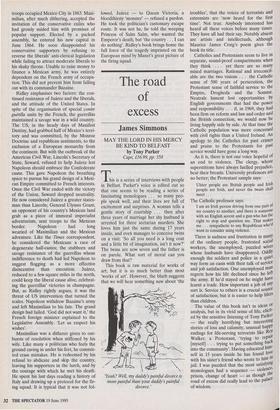Establishing a dangerous president
Raymond Carr
MAXIMILIAN AND JUAREZ by Jasper Ridley Constable, £16.95, pp. 362 On 19 June 1867 the Emperor Maxim- ilian of Mexico, brother of Franz Joseph Emperor of Austria, was shot by a firing squad in Queretaro; Maximilian's wife, daughter of King Leopold of the Belgians, Queen Victoria's uncle, had gone to Europe to rally support for her husband. Within a few weeks she lapsed into incur- able insanity. This is high historical drama, sure-fire stuff. Only a dullard could botch it up and Jasper Ridley tells the story well.
How did it come about that a tall, wispy Habsburg prince had been shot on the orders of Juarez, a swarthy, five-foot Indian lawyer who spoke only his native Zapatec till he was five? Once Mexico had won its independence from Spain in the 1820s it lapsed into anarchy as clerical conserva- tives fought anti-clerical liberals for the spoils of power. In 1855 the liberals in gov- ernment abolished the privileges of the church and nationalised its landed possessions. After defeat in the War of Reform which established Juarez as Presi- dent in 1860, conservative exiles in Europe intrigued to install a European prince as Emperor to end liberal 'anarchy' and estab- lish 'order'. They succeeded in interesting Maximilian.
Maximilian was at a loose end and had taken to botanising after making a mess of his time as Austrian viceroy of Lombardy. A conservative by breeding, nourishing half-baked liberal pretensions as a modern ruler, he was destined to become a mixed- up monarch. A prude — 'the sight of a naked woman', he wrote, 'frightens me' — he fathered a bastard by a gardener's daughter. Obsessed with protocol, he dis- appointed his subjects by wearing panama hats and telling risque stories. His idea of fun was to make losers at billiards crawl under the table, reconciling protocol and informality by getting his gentlemen-in- waiting to do his crawling when he himself lost.
Maximilian was to be installed as Emperor by Napoleon III whom he had once considered 'not so much an Emperor with a sceptre as a circus master with a whip'. Using as an excuse that the liberals refused to pay their foreign debts, French troops occupied Mexico City in 1863. Maxi- milian, after much dithering, accepted the invitation of the conservative exiles who had grossly misled him with promises of popular support. Elected by a packed assembly, he entered his new capital in June 1864. He soon disappointed his conservative supporters by refusing to reverse the liberals' anti-clerical legislation while failing to attract moderate liberals to his shaky throne. Unable to raise money to finance a Mexican army, he was entirely dependent on the French army of occupa- tion. This did not prevent him from falling out with its commander Bazaine.
Ridley emphasises two factors: the con- tinued resistance of Juarez and the liberals, and the attitude of the United States. In spite of the organisation of special contre guerilla units by the French, the guerrillas maintained a savage war in a wild country. The US, in the heady days of Manifest Destiny, had grabbed half of Mexico's terri- tory and was committed, by the Monroe Doctrine and republican sentiments, to the exclusion of a European monarchy from the continent. But with the outbreak of the American Civil War, Lincoln's Secretary of State, Seward, refused to help Juarez lest Napoleon should embrace the Confederate cause. This gave Napoleon the breathing space to pursue his grand design of a Mexi- can Empire committed to French interests. Once the Civil War ended with the victory of the Union, Seward dropped neutrality. He now considered Juarez a greater states- man than Lincoln; General Ulysses Grant, an opponent of his country's Mexican land grab as a piece of immoral imperialist adventurism, sent troops to the Mexican border. Napoleon had long wearied of Maximilian and the Mexican adventure. Like the Times correspondent, he considered the Mexicans a race of degenerate half-castes; the stubborn and savage resistance of the guerrillas whose indifference to death had led Napoleon to suggest flogging as a more effective disincentive than execution. Juarez, reduced to a few square miles in the north, could keep the liberal cause alive, celebrat- ing the guerrillas' victories in champagne. But, as Ridley rightly argues, it was the threat of US intervention that turned the scales. Napoleon withdrew Bazaine's army and left Maximilian to his fate. The grand design had failed. 'God did not want it,' the French foreign minister explained to the Legislative Assembly. 'Let us respect his wishes'.
Maximilian was a ditherer given to out- bursts of resolution when stiffened by his wife. Like many a politician who feels the ground caving in under his feet, he commit- ted crass mistakes. He is redeemed by his refusal to abdicate and skip the country, leaving his supporters in the lurch, and by the courage with which he met his death. He spent his last days reading a history of Italy and drawing up a protocol for the fir- ing squad. It is typical that it was not fol- lowed. Juarez — to Queen Victoria, a bloodthirsty 'monster' — refused a pardon. He took the politician's customary escape route. It was not he, he told the weeping Princess of Salm Salm, who wanted the Emperor's death, but 'the country . . . I can do nothing'. Ridley's book brings home the full force of the tragedy imprinted on the European mind by Manet's great picture of the firing squad.



















































 Previous page
Previous page